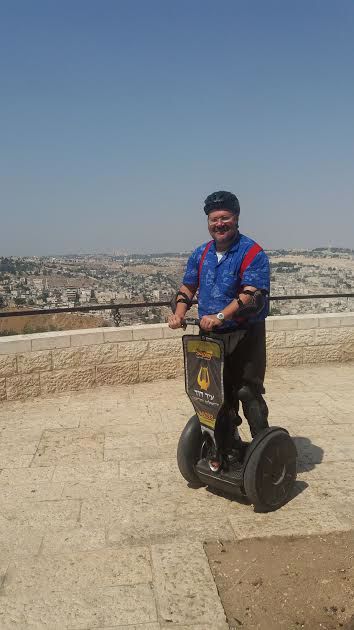The calendar is turning to September, and the anticipation is palpable. Jewish men and women the world over—and certainly, the children, too—are preparing for Rosh Hashanah. Meals are in the works, new clothes have been laid out, crafts and projects have been made.
And, of course, people are readying themselves for services and synagogue programs of all kinds.
But what happens when a family or individual, for one reason or another, has no regular shul to attend? What happens when they find themselves in a new town or in economic straits or, perhaps, decide at the last minute that they want to attend services?
Continuing a decades-long tradition that has drawn countless Jews into synagogues for the Jewish high holidays, Chabad-Lubavitch will hold thousands of free High Holiday services around the world as part of a model that has no dues and no membership—a model that other synagogues and organizations around the world are looking to replicate.
The message is: "Come one, come all. We will not turn you away."
"I feel that, especially if it is the first time a person comes to a shul, you want them to be comfortable and not think, 'Oh, I have to pay for it,' " says Rabbi Yitzchok Raskin, co-director of Chabad of Vermont in Burlington, Vt., with his wife, Zeesy. "We want people to get involved and get closer to Yiddishkeit."
Since fees can wind up an obstacle, he continues, "we are helping them out on Rosh Hashanah and Yom Kippur, when most people want to come to synagogue."
Enter Chabad, Literally
Chabad of Vermont will welcome about 100 people for services on Rosh Hashanah and Yom Kippur, quite an increase from the 30 or 40 for a typical Shabbat. The Raskins will also host a communal meal on Rosh Hashanah; a donation of $36 is requested, but anyone is welcome to attend.
It is Chabad's firm belief that Jewish traditions and customs are the birthright of every Jew, and that every Jew should have access to them.
This year's services bring added significance as Jewish communities worldwide celebrate the year of Hakhel, a time to promote Jewish unity and learning. Throughout the year, Jewish synagogues and organizations will host communal gatherings for men, women and children dedicated to encouraging the observance and study of Torah.
After all, it is Chabad's firm belief that Jewish traditions and customs are the birthright of every Jew, and that every Jew should have access to them.
"The idea that you have someone at the door and don't let a person in because they don't have a ticket is simply ridiculous," says Rabbi Yisroel Fried, program director with his wife, Esther Miriam, at Chabad of the West Side in New York. "Everyone has to be allowed into shul to daven."
Room for Everyone
So why charge a fee at all?
"We like people to reserve a space by buying a seat because sometimes we are so full we can't guarantee one," the rabbi explains. "But if someone can't afford it or money is tight, we don't hold people to the requested amount."
Chabad of the West Side can easily fit 250 people around tables in the sanctuary and can add more chairs along the walls, "but it gets really tight space-wise, especially for Kol Nidre and Neilah on Yom Kippur," says Fried. "Sometimes, we have some people just standing."
He notes that the synagogue has been asking for a seat fee for more than a decade, and that most people understand the need to do so.
"We do it in the lightest way possible, and everyone is guaranteed to come in," he stresses.
High Holiday services this fall bring added significance as Jewish communities worldwide celebrate the year of Hakhel, a time to promote Jewish unity and learning.
Chabad Houses that cannot accommodate the overflow holiday attendance often rent hotels or other spaces so all can come and pray for the holidays, and bring friends and family members. While a number of Chabad emissaries may have a donor who steps forward to underwrite the costs, most will ask for a nominal fee to help offset the charges.
Still, at the end of the day, Chabad emissaries prefer not to charge anything, and rabbis say that should never be the caveat for attending or not attending. Come one, come all—they'll make the room.
Such is the case at the Chabad of Waukesha-Brookfield in Wisconsin, co-directed by Rabbi Levi and Freida Brook. While people are asked to RSVP for High Holiday services, the registration page makes clear that all donations are optional.
"Participation in all High Holiday programs is free," says a note on the webpage. "Consider a donation to help cover the costs of these and other wonderful and vital programs that Chabad of Waukesha-Brookfield brings to our community."
Rabbi Brook believes that affiliation in the Jewish community, especially for the High Holidays, shouldn't come with any kind of price tag.
"We try and have no dues, even though we do have people come every week," he says. "That's not to say dues are a bad thing, but I don't want someone to be in a situation where they get turned away because of what is or what is not in their wallet."
To find out more about High Holiday services and programs at a Chabad center near you, visit the directory here.
The doors to Chabad-Lubavitch centers in North America and throughout the world are open for the High Holidays, offering free services to Jewish people, like at Chabad of Vermont in Burlington.








No comments:
Post a Comment